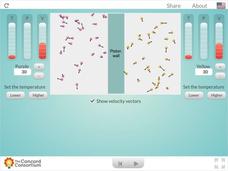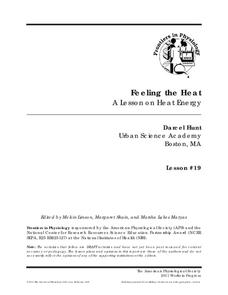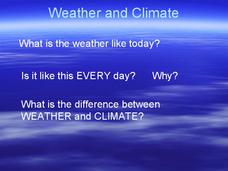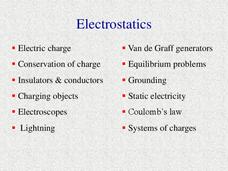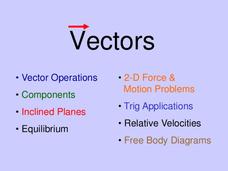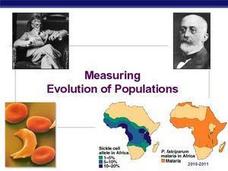Concord Consortium
Pressure Equilibrium
All together now! Physical science pupils observe the effects of temperature and amount of substance on pressure and volume of a gas. The interactive resource guides learners through the Combined Gas Law, where they observe changing...
CK-12 Foundation
Passive Transport
Some molecules move through a membrane with diffusion while others require protein channels. The video and interactive discuss both types of passive transport. Challenge questions allow scholars to demonstrate their understanding.
American Physiological Society
Feeling the Heat
How do the changing seasons affect the homes where we live? This question is at the forefront of engineering and design projects. Challenge your physical science class to step into the role of an architect to build a model home...
Bowels Physics
Torque: Rotational Statics and Rotational Dynamics
Scholars examine the application of torque in relation to motion by viewing a comprehensive presentation that explains the basic concepts related to torque and rotational motion. The lesson ends with examples showing how to calculate...
Curated OER
Equilibrium Calculations
The equilibrium constant does not change — as long as the temperature remains unchanged. Here's presentation that briefly reviews equilibrium constants before working through four practice problems, including three calculating...
Curated OER
Weather and Climate
It's hot today, but is that the weather or the climate? This colorful presentation isolates both concepts to allow for better understanding by covering the positioning of the planet, making comparisons of land versus water, and looking...
National Institute of Open Schooling
Spontaneity of Chemical Reactions
Do spontaneous reactions really occur? Activity 12 in a series of 36 focuses on spontaneity of chemical reactions. Learners read about, discuss, and answer questions pertaining to entropy, explain the third law of thermodynamics, explore...
Urbana School District
Electrostatics
Why did lightning shock the man? Because it didn't know how to conduct itself. Presentation covers electric charges, insulators, conductors, electroscopes, lightning, generators, grounding, static electricity, and more. Presentation...
Urbana School District
Vectors
I don't always make vector jokes, but when I do, IJK. Vector addition using multiple methods, scalar multiplication, vector subtraction, vector components, relative velocities, free body diagrams, and so much more Are covered in this...
Virginia Department of Education
Equilibrium and Le Chatelier’s Principle
The best part of learning about equilibrium is that nothing changes. Young chemists observe four demonstrations during this lesson: equilibrium in a saturated solution, equilibrium with an acid-base indicator, equilibrium with cobalt...
Curated OER
Unit VII: Energy: Worksheet 2 Hooke's Law
Physic starters spring into energy with a problem-solving worksheet. They work with graphs, apply Hooke's law, draw force diagrams, and solve for distance, force, or mass in spring systems. There are seven problems in all.
Curated OER
Organic Chemistry Problem Set Exam 1
Though there are technically only 13 questions on this exam, they take up six pages and make a thorough assessment of organic chemistry principles. There are plenty of diagrams to label or complete. Emission spectra are displayed for...
Curated OER
Organic Chemistry 231, Martin Larter, Exam 1
If you need a straightforward and comprehensive organic chemistry exam, check this one out. Chemistry pupils identify functional groups in molecule diagrams, draw a Lewis structure, fill in a table about molecular shape, predict boiling...
Curated OER
CPO Science - Foundations of Physics
An object in motion will remain in motion, and your physics learners will really get moving by viewing this PowerPoint! They examine each of Newton's laws of motion, learning about force, inertia, acceleration, and equilibrium. They are...
Curated OER
2005 U.S. National Chemistry Olympiad - Local Section Exam
National Chemistry Olympiad tests are released after their use each year, since they cannot use them again for this event. The result: outstanding comprehensive assessment resources for general chemistry classes! This 2005 version covers...
Curated OER
Demand and Supply—It’s What Economics Is About!
In this economics instructional activity, learners examine the principle of supply and demand related to the oil market as they identify factors that cause curves and shifts and determine equilibrium. Upper graders read an informational...
Curated OER
Hardy-Weinberg Lab Data
The ten slides give multiple examples of Genetic Drift, or cases of particular genetic populations. Each set of data requires an explanation and the allele frequency changes should be easy for your students to calculate.
Curated OER
Acceleration or Equilibrium
After instructions are given on the first slide, the following six slides give data that the students can use to determine acceleration or equilibrium. The next six slides then show the same diagrams with the answer of the net force. A ...
Curated OER
Measuring Evolution of Populations
The Hardy-Weinberg principle is the focus of this concise slideshow. Some vocabulary definitions are given on the first 2 slides, and the rest are given over to examples of the Hardy-Weinberg theorem. Calculations of the H-W...
Curated OER
Approaching Equilibrium
Contrary to a common popular belief, equilibrium does not mean a reaction has stopped. An interesting presentation covers reactant concentrations and product concentrations. It describes the equilibrium as when the forward rate equals...
Curated OER
Enthalpy and Entropy
An entertaining presentation introduces both enthalpy and entropy. It explains equilibrium as the balance between these two measures and provides simple diagrams and graphics for additional clarity.
Curated OER
Version 001 – Exam 1 – David Laude (53015) 1
A 30-question multiple choice chemistry test challenges takers. Topics touched upon include thermochemistry, equilibrium, behavior of gases, and pH. Problem solving is required in order to answer most of the questions. Other questions...
Curated OER
Dissolved Gases in Water
Using different types of water, earth science explorers set out to prove the ocean's ability to absorb greenhouse gases. They shake, heat, and freeze the water samples to examine gas content. This lesson plan is useful during a unit...
Curated OER
Acids and Bases
For this acids and bases worksheet, learners compare the properties of acids and bases. Students determine the concentrations required to neutralize solutions. This worksheet has 1 word problem and 14 multiple choice questions.


